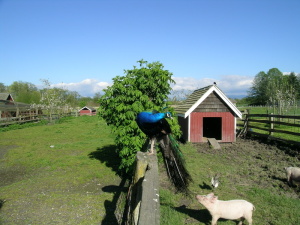 Human Ecology brings together two words that tend to be at opposite ends of the debate. There are those who think that the human being is a plague that threatens the nature and survival of planet earth and therefore must be if not eliminated, at least draconianly contained. There are those who minimize environmental problems and criticize ecological policies, arguing their high cost and impact on economies, if not on people’s freedom. Both trends ignore the profound interdependence between the environment and the human race.
Human Ecology brings together two words that tend to be at opposite ends of the debate. There are those who think that the human being is a plague that threatens the nature and survival of planet earth and therefore must be if not eliminated, at least draconianly contained. There are those who minimize environmental problems and criticize ecological policies, arguing their high cost and impact on economies, if not on people’s freedom. Both trends ignore the profound interdependence between the environment and the human race.
It is contradictory to call human beings a plague and at the same time urge them to take measures to improve the ecology. The natural sciences have documented ecological successions in which species replace other ones in process of becoming extinct, but no one sets out to convince plants or animals to be more tolerant or less voracious by preying on the species on which they feed. This shows us that it is the human being who can contribute the most, either to the destruction of nature or to its recovery and harmonious use, and the only one who can freely choose one way or the other.
It is equally contradictory to pretend to establish man as the absolute owner of natural resources and to abuse and exploit them without the corresponding concern for the consequences of those actions. Sacrificing the planet that we will leave to future generations, to the orthodoxy of an economic or market model that demands the unrestricted use of these resources, is extremely selfish and negligent. Ignoring ecological problems assuming that technology will solve them without much effort or sacrifice on our part is naive and seems to idolize technology by giving it almost unlimited powers.
Human Ecology, in the little more than a century of its existence, has come to define areas of study in geography, ecology, sociology, urbanism, architecture, psychology and culture and perhaps some more. It has oscillated between being a multidisciplinary perspective and serving specific disciplines.
Today it is Human Ecology that should seek to integrate natural ecology and what makes up the environment in which human beings develop, seeking a harmonious and fruitful interrelation. In this way it can show people and institutions a positive path to contribute to a healthier and more stable world.
Monthly Archives: May 2013
La Ecología Humana Hoy – El Comercio 28/5/13
 Ecología Humana reúne dos palabras que suelen estar en extremos opuestos del debate. Hay quienes piensan que el ser humano es una plaga que amenaza la naturaleza y la supervivencia del planeta tierra y por tanto debe ser si no eliminada, al menos contenida draconianamente. Hay quienes minimizan los problemas ambientales y critican las políticas ecológicas arguyendo su elevado costo e impacto en las economías, cuando no en la libertad de las personas. Ambas tendencias ignoran la profunda interdependencia entre el medio ambiente y la raza humana.
Ecología Humana reúne dos palabras que suelen estar en extremos opuestos del debate. Hay quienes piensan que el ser humano es una plaga que amenaza la naturaleza y la supervivencia del planeta tierra y por tanto debe ser si no eliminada, al menos contenida draconianamente. Hay quienes minimizan los problemas ambientales y critican las políticas ecológicas arguyendo su elevado costo e impacto en las economías, cuando no en la libertad de las personas. Ambas tendencias ignoran la profunda interdependencia entre el medio ambiente y la raza humana.
Es contradictorio calificar de plaga a los seres humanos y al mismo tiempo exhortarlos a tomar medidas para mejorar la ecología. Las ciencias naturales han documentado las sucesiones ecológicas en que especies reemplazan a otras que se extinguen, pero nadie se propone convencer a plantas o animales que sean más tolerantes o menos voraces al hacer presa en las especies de que se alimentan. Esto nos evidencia que es el ser humano el que puede contribuir más, ya sea a la destrucción de la naturaleza o a su recuperación y uso harmonioso, y el único que puede optar libremente por uno u otro camino.
Es igualmente contradictorio pretender erigir al hombre en dueño absoluto de los recursos naturales y abusar y explotarlos sin la correspondiente preocupación por las consecuencias de esas acciones. El sacrificar el planeta que dejaremos a las generaciones futuras a la ortodoxia de un modelo económico o de mercado que reclama el uso irrestricto de dichos recursos, es de un egoísmo y negligencia gravísimos. El ignorar los problemas ecológicos asumiendo que la tecnología los resolverá sin mayor esfuerzo o sacrificio de nuestra parte es ingenuo y parece idolatrar la tecnología atribuyéndole poderes casi ilimitados.
Ecología Humana, en el poco más de un siglo de su existencia, ha pasado por denominar áreas de estudio en la geografía, la ecología, la sociología, el urbanismo, la arquitectura, la sicología y la cultura y quizá algunas más. Ha oscilado entre ser una perspectiva multidisciplinaria y estar al servicio de disciplinas específicas.
A la Ecología Humana toca hoy busca integrar la ecología natural y lo que conforma el ámbito en que se desenvuelven los seres humanos, buscando una interrelación armoniosa y fructífera. Así puede mostrar a las personas e instituciones un camino positivo para contribuir a un mundo más sano y estable.
